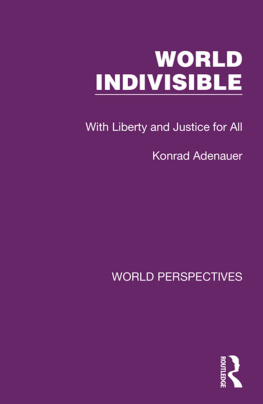GERMANY AND ISRAEL
Germany and Israel
MORAL DEBT AND NATIONAL INTEREST
George Lavy
First published 1996 by
FRANK CASS & CO. LTD.
Published 2013 by Routledge
2 Park Square, Milton Park, Abingdon, Oxon OX14 4RN
711 Third Avenue, New York, NY, 10017, USA
Routledge is an imprint of the Taylor & Francis Group, an informa business
Copyright 1996 George Lavy
British Library Cataloguing in Publication Data
Lavy, George
Germany and Israel : moral debt and national interest
1. World War, 19391945 Reparations 2. Germany Foreign relations Israel 19453. Israel Foreign relations Germany 1945
I. Title
327.4305694
Library of Congress Cataloging-in-Publication Data
Lavy, George, 1921
Germany and Israel : moral debt and national interest / George Lavy.
p. cm.
Includes bibliographical references and index.
1. GermanyRelationsIsrael. 2. IsraelRelationsGermany. 3. GermanyEthnic relations. 4. Holocaust, Jewish (19391945)GermanyInfluence. I. Title.
DD258.85.I75L38 1996
327.4305694'045dc20
95-12715
CIP
ISBN 13: 978-0-714-64626-8 (hbk)
ISBN 13: 978-0-714-64191-1 (pbk)
All rights reserved. No part of this publication may be reproduced in any form or by any means, electronic, mechanical, photocopying, recording or otherwise, without the prior permission of the publisher.
Typeset by Vitaset, Paddock Wood
To Phyllis
Contents
This book is based on my PhD thesis at the University of London.
I am indebted to the Social Science Research Council for a grant enabling me to undertake a period of study in Germany, to the Royal Institute of International Affairs for allowing me to use their press archives, the Wiener Library in London, the Germania Judaica in Cologne, the Bundestag Library and the archives of the Deutsch-Israelische Gesellschaft in Bonn.
My thanks also to Mr Philip Windsor, Reader in International Relations at the London School of Economics, for his encouragement and help with my research.
G.L.
London, February 1990
| APO | ausserparlamentarische Opposition |
| CDU | Christlich Demokratische Union |
| CSU | Christlich Soziale Union |
| DGB | Deutscher Gewerkschaftsbund |
| DM | Deutsche Mark |
| dpa | Deutsche Presseagentur |
| EC | European Community |
| EDC | European Defence Community |
| EU | European Union |
| FAZ | Frankfurter Allgemeine Zeitung |
| FDP | Freie Demokratische Partei |
| GDR | German Democratic Republic |
| NATO | North Atlantic Treaty Organisation |
| NPD | Nationaldemokratische Partei Deutschlands |
| NS | nationalsozialistisch |
| OPEC | Organisation of Petroleum Exporting Countries |
| SED | Sozialistische Einheitspartei Deutschlands (the one-time ruling communist party of the GDR) |
| SPD | Sozialdemokratische Partei Deutschlands |
| SS | Schutzstaffel (para-military organisation, later part of the regular fighting forces of the Third Reich) |
| Sdd. Ztg. | Sddeutsche Zeitung |
| UAR | United Arab Republic |
| UN, UNO | United Nations, United Nations Organisation |
| US, USA | United States of America |
| USSR | Union of Soviet Socialist Republics |
| vol. | volume |
Sovereign states, in their behaviour towards each other, are normally motivated by self-interest. At least that is the general assumption. The occasions where a government will act for purely moral reasons towards another country are rare. Some say it never happens. It is quite respectable for governments to justify their actions by saying that they were taken in the national interest. And even where there is the rare case of a government acting for a moral reason, it may be reluctant to admit it for fear of criticism by its own people that it is giving something away.
In the case of West Germany there is some controversy about what caused its first governments to act towards Israel in the way it did. But the relationship between the State of Israel, founded in 1948, and the Federal Republic of Germany, established by the victorious western powers in the summer of 1949, is indeed an unusual one. West GermanIsraeli relations began in the early 1950s against the background of the Hitler regimes extermination of millions of Jews during the Second World War. This act of genocide has had a profound psychological effect on both the Jewish and German peoples which neither has as yet been able to overcome completely. The relations between West Germany and Israel owe their unusual character to the Nazi Holocaust and remain in its shadow to this day.
Shortly after the founding of the Federal Republic the Israeli government lodged a claim against the Germans for material compensation for the horrors committed against the Jews by Hitlers Third Reich. That the West Germans, under their first Chancellor Konrad Adenauer, agreed after protracted negotiations to pay compensation and indeed a considerable amount was believed to have been motivated by self-interest: they wanted to ingratiate themselves with the three western powers still occupying their country in order to win concessions from them. But it could be argued that by the time the compensation agreement was being negotiated in the summer of 1952 the West Germans had been accepted by the occupying powers as trusted members of the international community. There would, therefore, be no need for them to demonstrate their atonement for the past by large compensation payment to Israel.
Israel, for its part, considered that the Germans owed to the Jewish people and, by extension to the Israelis, a moral debt of which material compensation was only one factor, to be followed by aid to Israel in the diplomatic, economic and military fields. This was broadly accepted by the West German government but became difficult to implement when in the mid-1950s the Federal Republic, now a sovereign state and no longer occupied, had to conduct its own foreign policy and its government had to respond to the growing tensions in a divided world. Because of the division of Germany the Federal Republic became more deeply involved in the Cold War while Israel was engaged in bitter conflict with its Arab neighbours. Bonn soon became a point of interaction between the two conflicts and had to decide how far it could go in supporting Israel on moral grounds when the national interest dictated other policies.
The object of this book is not to account in detail for everything that has passed between Bonn and Jerusalem over the last 40 years, but to trace the development of West GermanIsraeli relations in the context of the international pressures exerted on both states during that period, and to show that a case can be made for saying that at important moments in the history of Israel the West Germans supported it for reasons of conscience rather than out of self-interest.
First Contacts: Compensation
It was through compensation that the relationship between Israel and West Germany began. The requirement that the Germans must pay compensation to the victims of Nazi oppression, to those, that is, who were physically or economically harmed for reasons of race, creed or nationality, goes back to the period of military government before the creation of the two German states. It was the three western occupying powers that promulgated laws to that effect. But this was a case of compensation directed to individuals and not to the states which had fought the Germans during the war. That came into a different category, usually termed reparations. These were imposed by the Potsdam Agreement, concluded by the four major powers in 1945, well before the State of Israel had come into existence.









